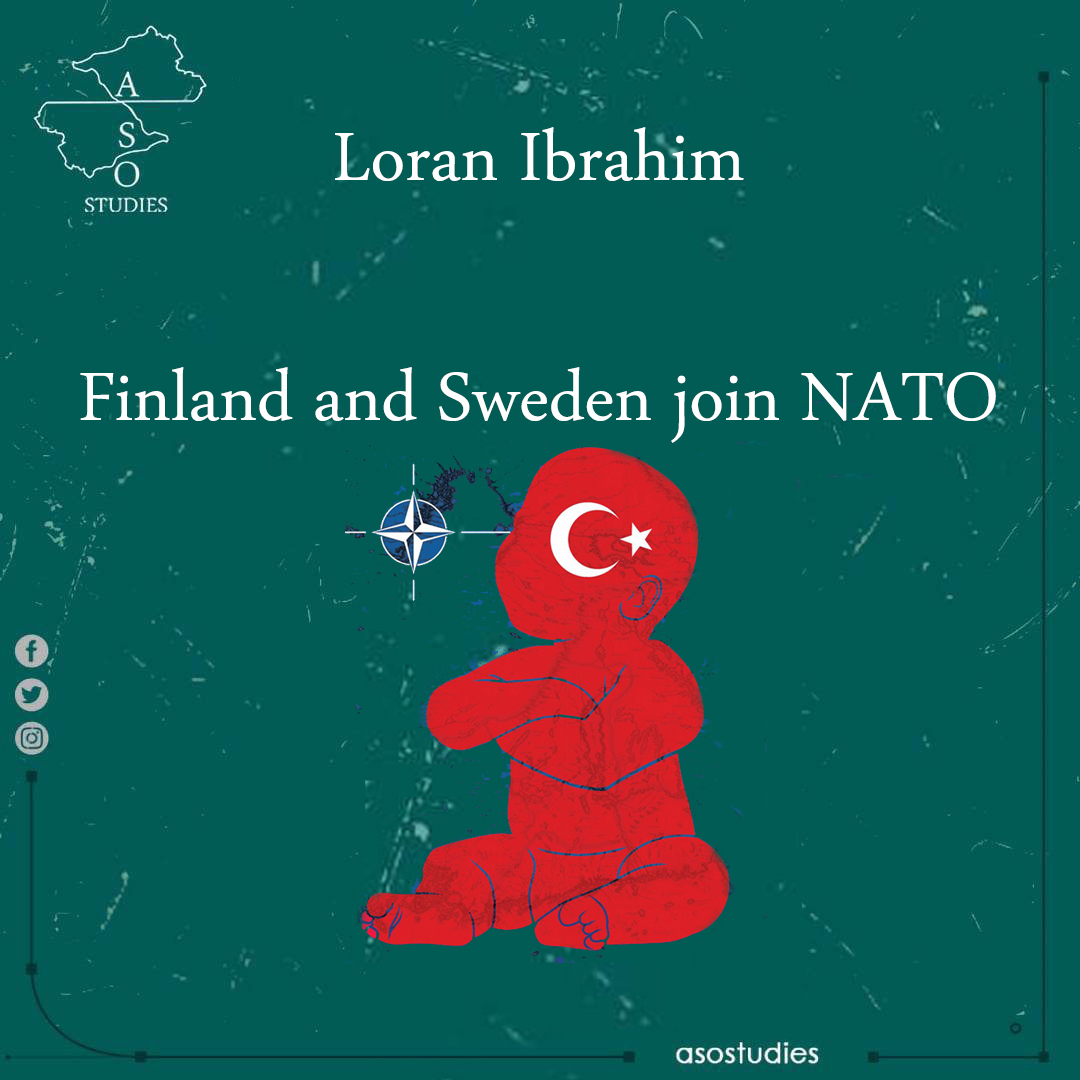Finland and Sweden join NATO
Loran Ibrahim
contrary to the Russian president’s statement on not having any border conflict between the countries that are about to join NATO, there is a long-term conflict between the Scandinavian countries and Russia whether in Baltic Sea region, or the sea range overlooked by Russia through a geographically separated territory the same as Kaliningrad sited at the corner between Poland and Lithuania or the Arctic Ocean range where ballistic missile bases deployed for confronting Norway, Finland, and Sweden.
Anyway, Putin has rectified the situation by releasing a typical threat that he is hell-bent on intensifying the military bases and missiles batteries with the Nouvelles border of NATO with Russia, especially on the Finnish border, which, by its territorial nature, is incapable of conducting conventional military operations. The same is true in the Arctic Ocean. If the war breaks out, it will be radically different from the open strategy adopted by the Russian military, which has not changed from the tradition of the Russian Soviet military establishment, which is based on a scorched-earth policy and the violation of all international laws and norms related to the laws of war.
Technical superiority in sub-nuclear armaments tends to be significantly disproportionate in favor of NATO countries. America doubled the number of its troops in Europe from 20,000 to 100,000, and sent more F-35 super planes. and other battleships and attack missiles. Not to mention NATO's special military maneuvers on Norwegian soil, which lasted for two months.
Turkey, in contrast, has tended to satisfy their interests in the relationship with NATO. Note that the agreement signed between the three parties (Sweden, Finland and Turkey) did not include unknown details. It revolved around the Scandinavian countries' relationship with the PKK and the Fethullah Gülen Organization. In addition to removing the arms embargo imposed by these countries on Turkey, as a form of protest against Turkish military operations against Kurdish forces in Syria in 2019.
The most institutionalized democracies in the world can be represented in the political system in Scandinavia, and its agreement with an authoritarian regime like the Turkish regime will not go through undemocratic mechanisms. Or so it is assumed.
Therefore, the Swedish Minister of Justice did not delay in stating that the Swedish judiciary is an absolutely independent authority, and that it is not possible to influence the decisions of the judiciary in these two countries with illegal tools. Not to mention the impossibility of extraditing Swedish citizens, whose ethnic origin was important, to another country. Therefore, the work of organizations and institutions affiliated with the Kurdish Party in these countries will be restricted, direct support for the Autonomous Administration will stop, and the movement of money transfers will become more complicated, if not stopped in the short term.
Indeed, this agreement was in line with the obvious expectations of international politics. States dispute diplomatically to get as much benefits as possible from each other. Because the Autonomous Administration in northern and eastern Syria lacks political experience, it does not have a clear or recognized political entity. Therefore, it has not prepared itself for these complexities related to the struggle of major powers in the Middle Eastern region.
It would have been more prudent, and this is too late and in vain now, for the Kurdish powers, whose accession of Sweden and Finland depends on the relationship of this country with it, to be diplomatic in their relationship with themselves as a political organization, and in their relationship with other Kurdish forces, even before their relationship with their Turkish enemy and their relationship with the Western countries that supported them. In short, it had to be a political movement, not a fossilized ideology. Had it done so, it would have changed considerably from what the region is today.
Conversely, to the essence of the Swedish rule of law, the latter extradited a wanted Kurdish man to Turkey on the third of December. Mahmoud Tat who took refuge in Sweden in 2015. He returned to Turkey, where police picked him up at the airport, and within a week sentenced him to prison. However, Mahmoud is not a Swedish citizen, and his asylum application has not been granted. Finland has not yet been subjected to Turkish blackmail.
The dilemma, as stated above, is that because of the Russian-Ukrainian war, the two Scandinavian countries may be forced to suspend their laws, act as if they are at war, violate their democratic values, and sacrifice some offerings, such as the Kurds, in order to join NATO and obtain nuclear and military protection in the face of the Russian threat, which will not disappear again from the European imagination.
On the basis of the current situation, political maneuvering will be required of the Kurdish parties, whose presence has become articulated in Turkey's blackmail agreements with Sweden and Finland. However, the Kurdish side is not good at the political sphere, and prefers to mobilize people in demonstrations to cheer for their sole leader, instead of thinking of striking Turkey diplomatically, by media and legally under its pretexts.
For Kurds accession can be influential in the process, even though they cannot join the agreement as a signatory. It is quite enough for politics to prevail over partisan doctrine for diplomatic action to begin confronting Turkey with legal tools and through American and European institutions that support Kurdish rights, and anti-Turkey, which Erdogan has reconstituted as an anti-Western state.

